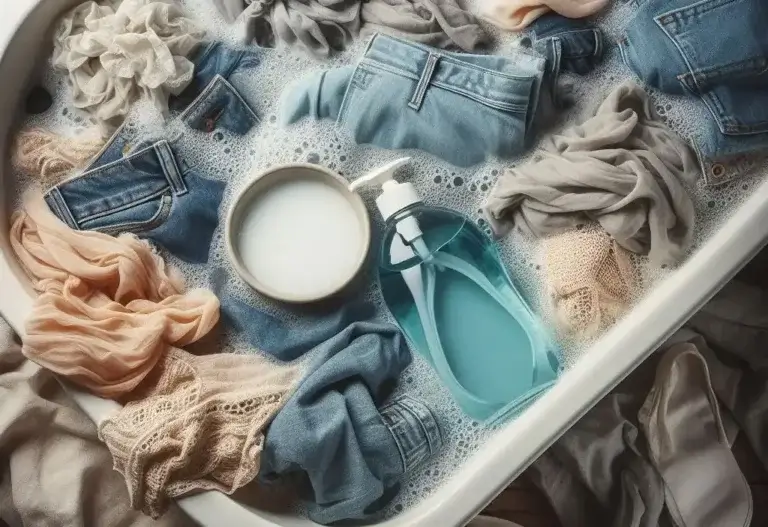Can You Use Hand Soap to Wash Clothes? The Complete Guide for Laundry Detergent Alternative
Have you ever run out of laundry detergent and wondered if you can use hand soap to wash your clothes instead? With the rising costs of everyday items like laundry detergent, more people are looking for budget-friendly alternatives.
In this complete guide, we’ll cover whether can you use hand soap to wash clothes, the pros and cons, which types of hand soap work best, proper handwashing techniques, drying methods, and more laundry detergent alternatives. Read on to learn everything you need to know about using hand soap for washing clothes!
Table of Contents
Can You Use Hand Soap to Wash Clothes?

The short answer is yes, you can use hand soap to wash your clothes in a pinch if you’ve run out of regular laundry detergent. Hand soap is designed to cut through oil, grease, and dirt on your skin. Many types can also work to remove some stains and soils from fabrics.
However, hand soap may not clean clothes as thoroughly as laundry detergent. Laundry detergents contain specialized ingredients and enzymes to penetrate fibers and remove body soils, oils, and stains that hand soap isn’t formulated for.
While hand soap can work decently as a laundry detergent alternative, it may take more effort to get your clothes clean. You’ll likely need to hand wash, possibly with a few repeated rinses, and spot-treat any stubborn stains.
Below, we’ll explore the pros and cons of using hand soap on laundry so you can decide if it’ll work in a pinch.
The Pros of Using Hand Soap on Clothes
Here are some potential advantages of using hand soap to wash clothes:
- It’s readily available. Most people have hand soap at home already, making it a convenient alternative when you’ve run out of laundry detergent unexpectedly.
- Some formulas cut grease. Hand soaps made with ingredients like sodium laureth sulfate can cut through body oil, grease, and dirt.
- It may work for lightly soiled items. Hand soap can potentially remove surface dirt, light sweat, and other soils from casual clothing that hasn’t been heavily worn.
- It saves money over time. Skipping and buying laundry detergent here and there by using hand soap you already have adds up, saving you cash.
- It works in a small load. For just a few items that need washing, hand soap may get the job done.
The Cons of Using Hand Soap on Clothes
However, there are also some downsides to consider when using hand soap in laundry:
- It may not be deep clean. Hand soap isn’t designed to clean the same way laundry detergent is. It likely won’t remove heavier soils, set-in stains, or oils as well from fabric.
- Clothes may need multiple rinses. Without laundry detergent to carry away soil, you may need to rinse garments multiple times under the faucet to get rid of residue.
- Stubborn stains may linger. Hand soap likely does not have the stain-fighting enzymes and bleach alternatives laundry detergents contain to break down and remove stuck-on stains.
- It can damage delicate fabrics. Some hand soaps contain dyes, fragrances, and other harsh ingredients that could wear down silks or cause color loss over time with repeated use.
- Clothes may retain odors. Laundry detergents help neutralize and eliminate odors that hand soap isn’t formulated for. Your clothes may develop a stale smell.
If you do opt to use hand soap in place of laundry detergent, hand washing your clothes is best since you’ll be able to thoroughly scrub and rinse each garment. Read on for tips!
What Type of Hand Soap is Best for Laundry?

If you’ve decided to use hand soap for washing clothes, liquid hand soap or body wash typically works better than bar soap. The sudsing ability of liquids helps release more dirt and stains from fabric.
Some key things to look for include:
- Mild surfactants: Cleansing agents like sodium laureth sulfate or sodium lauroyl glutamate help hand soap cut through oil and grease.
- Grease-cutting power: Formulas designed to remove stubborn dirt, oil, and grime from hands can also work to clean clothes.
- Skin-friendly ingredients: Gentler hand soaps are less likely to contain dyes or fragrances that could damage delicate fabrics.
- Soap-free washes: Surfactant-based body washes without true soap tend to rinse cleaner from fabrics.
Steer clear of antibacterial hand soaps or heavily perfumed formulas that could leave a residue. Delicate body washes for sensitive skin are ideal for hand-washing clothes
Compare labels and aim for plant-based, eco-friendly hand soaps whenever possible. Greener options are safer for you and better for the water supply after rinsing.
Step-by-Step Guide to Hand Washing Clothes with Soap

Ready to tackle that pile of laundry without laundry detergent? Here is a simple 7-step method for effectively hand washing clothes using hand soap:
Supplies Needed
- Hand soap (liquid or bar)
- Large bowl, sink, or basin
- Water
- Soft bristle scrub brush (optional)
- Second empty the bowl, basin, or sink
Hand Washing Clothes Instructions
- Sort clothes: Check labels and separate them by fabric type and color to prevent bleeding or damage. Group by heaviest soil to wash the least dirty clothes last using the cleanest water.
- Fill wash basin: Plug the sink or fill a large bowl about halfway with warm water. Swish the water to create light suds.
- Add soap: For liquid hand soap, squirt a small amount around the edge of the water. For bar soap, create a soap jelly by grating bar soap into a strainer and letting water melt over it into your basin.
- Add clothes: Place one garment at a time into the soapy water, gently pushing below the surface. Let it soak for 5-10 minutes so the soap can start working.
- Scrub clothes: Use your hands or a soft bristle brush to gently scrub any visibly soiled areas, taking care of delicate fabrics. The warmth will loosen the grease so it rinses away.
- Rinse clothes: Drain the wash water and refill your basin with clean, cool water for rinsing. Move garments up and down, allowing fresh water to flow through clothing. Drain and repeat rinsing until no soap residue remains.
- Dry clothes: Drain excess moisture by rolling clothes in a towel. Lay flat or line dry, allowing garments to completely air dry to prevent odor issues. Avoid heat-drying machine washing afterward.
Follow up by spot-treating any lingering stains or pits with stain remover, lemon juice, or white vinegar before machine washing as usual.
Can You Use Other Soaps to Hand-Wash Clothes?
If you don’t have hand soap available, you may be wondering if dish soap, shampoo, or bar soap can substitute for hand washing laundry. Here’s an overview:
Dish Soap
Dish soap is effective at cutting through grease-dried on dishes in hot water. However, clothing fabrics and dyes often react poorly to prolonged contact with the harsh degreasers in dish detergent. It’s best avoided for hand-washed clothes unless extremely diluted.
Shampoo
Shampoo is formulated for hair and scalp oils, which are quite different than body oils and sweat that build up on clothing fabric. Most shampoos also contain fragrances and silicone that could leave a residue. The shampoo is not the best soap alternative for hand washing laundry.
Bar Soap
Bar soap designed for the body is the next best option after liquid hand soap or body wash. Opt for a gentle bar formulated for sensitive skin without dyes or perfumes. Grate it into your wash water and let it melt to create soap jelly water for washing clothes similar to hand soap. Rinse thoroughly after.
No matter what soap you use, it likely won’t equal the cleaning ability of purpose-made laundry detergent. But in a pinch, hand soap and other body cleansing soaps can get the job done!
6 Laundry Detergent Alternatives For Hand Washing Clothes
If you’re looking for other budget-friendly substitutes for store-bought detergent besides hand soap, here are 6 laundry detergent replacements to consider:
- Baking soda – Excellent at removing odors and boosting other cleaner’s effects. Use 1⁄4-1⁄2 cup per load.
- Washing soda – Helps remove stubborn stains. Use 1⁄4-1⁄2 cup per load.
- Borax – Boosts stain removal. Use 1⁄8-1⁄4 cup per load.
- Bar soap – As mentioned, a great backup to hand soap for hand washing clothes.
- Liquid castile soap – Made from vegetable oils. Use 2-3 tablespoons per load.
- Vinegar – Helps cut grease and deodorize. Use 1⁄4-1⁄2 cup white vinegar per load.
For best results, combine one of the above DIY detergent boosters with a small amount of hand soap or other body wash soap. The combination becomes more effective at lifting stains. Adjust amounts based on load size and soil level.
While homemade substitutes save you money upfront, it often takes more effort to get clothes truly clean. But they can work great for casual clothes in a bind!
FAQs About Using Hand Soap on Laundry
Here are answers to some of the most frequently asked questions about washing clothes with hand soap:
Should you use hand soap every time you do laundry?
No, for best cleaning results, laundry detergent specifically formulated for fabric should be your first choice whenever possible. Reserve hand soap for occasional backup when you’ve run out of regular detergent.
What about using hand soap in a washing machine?
Hand soap may not dissolve or rinse as well from machine wash cycles. To prevent build-up or residue on clothes, it’s better suited for hand washing garments until you can replace your regular laundry detergent.
Can hand soap cause damage over time to fabrics?
It’s possible. Repeated use of hand soap could slowly erode delicates like silk, wool, or sprayed fabrics. The fragrances and chemicals may also cause premature fading on some fabrics and colors. It’s safest for occasional gentler hand-washed loads only.
How much hand soap do you need per wash load?
As a guideline, use approximately 2-4 tablespoons of liquid hand soap per sink or basin filled partway with water for hand washing. Scale up or down as needed based on your water amount and the number/size of garments washed.
The Bottom Line
While hand soap should not fully replace laundry detergent long term, it can work decently as a budget fix in a pinch when you’ve run out. Follow our tips on which hand soap works best, how to properly hand wash, plus 6 other laundry detergent DIY alternatives. Take it from us—you really can use hand soap to wash clothes successfully when needed!
What other off-label laundry hacks do you rely on? Share your best budget-friendly detergent tips and tricks with us below!








